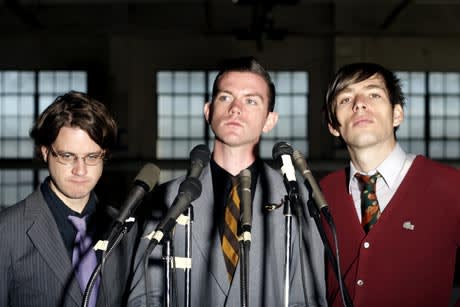Seattle, WAs the Dead Science conjure an operatic, post-punk masterpiece with Villianaire, a theatrical, mysterious rock record partially inspired by the slums of Shaolin. Sam Mickens, Jherek Bischoff and Nick Tamburro are like a mini-Voltron, forming a remarkable trio with an ambitious artistic vision. From the mesmerizing "Throne of Blood (The Jump Off), Villainaire bursts with devastating dynamics the compositional craftsmanship and exploratory sonic make-up of the Dead Science are stunning. Theres meaty power and dignified conviction within their interplay, as Mickenss choppy guitar and gorgeous, airy voice (which falls somewhere between Freddie Mercury and Shudder to Thinks Craig Wredren, who contributes back-ups) mingles with Bischoff and Tamburros intricate rhythms, and a slew of sonic textures, including flurries of strings. Lyrically, Villainaire delves into abstract mythology, where epic tales of ancient honour are filtered through a high-minded, contemporary analysis of oppositional relationships and empire. Interestingly, there are many obscure references to Wu-Tang Clan songs and members woven within the original narratives, while the album bears the inscription: "Dedicated in word and deed to the Wu-Tang Clan. Conveying basic instincts with purposeful sophistication, the Dead Science bring their own ruckus with Villainaire, an indisputable triumph.
What inspired Villainaire's sound?
Mickens: This was the first record weve done entirely by ourselves. We took as much time as we wanted refining everything, allowing the arrangements to develop. In terms of influences, we incorporated elements from modern R&B music, those kinds of sounds, but re-contextualized in unexpected places.
Does mythology interest you?
Yeah, absolutely. As a young kid, I was really obsessed with Greek mythology, and also comic books. The record deals with that idea of absorbing and making yourself a part of these mythologies. In a way, youre personalizing the mythology but also mythologizing yourself. I think thats maybe what happens in madness or whatever, but hopefully this is a little more separate.
And you feel Wu-Tang are forever?
In the last few years Ive come to a new understanding of my relationship with their work and Ive gotten really excited about it. Theyre really commendable in terms of self-mythologizing and being people who came from poverty-stricken environments but made themselves into superhuman characters just by force of will. Its great how much content they encrypt. Thats definitely something I like and want to do in the things that I make have a whole lot of material threaded through.
What inspired Villainaire's sound?
Mickens: This was the first record weve done entirely by ourselves. We took as much time as we wanted refining everything, allowing the arrangements to develop. In terms of influences, we incorporated elements from modern R&B music, those kinds of sounds, but re-contextualized in unexpected places.
Does mythology interest you?
Yeah, absolutely. As a young kid, I was really obsessed with Greek mythology, and also comic books. The record deals with that idea of absorbing and making yourself a part of these mythologies. In a way, youre personalizing the mythology but also mythologizing yourself. I think thats maybe what happens in madness or whatever, but hopefully this is a little more separate.
And you feel Wu-Tang are forever?
In the last few years Ive come to a new understanding of my relationship with their work and Ive gotten really excited about it. Theyre really commendable in terms of self-mythologizing and being people who came from poverty-stricken environments but made themselves into superhuman characters just by force of will. Its great how much content they encrypt. Thats definitely something I like and want to do in the things that I make have a whole lot of material threaded through.




